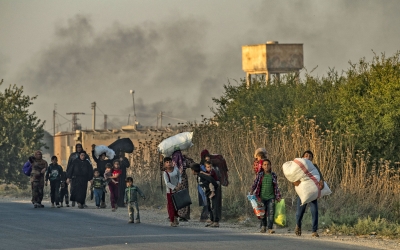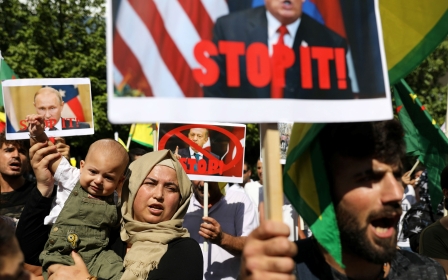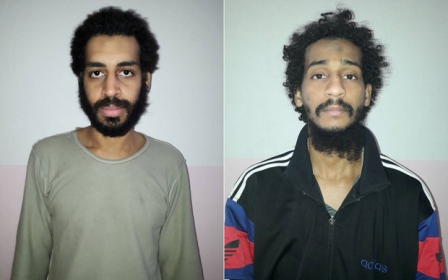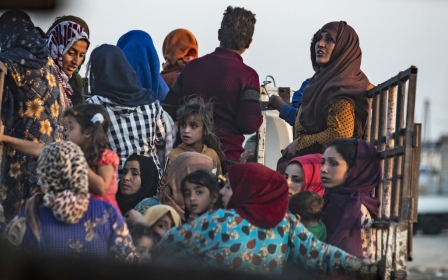'Agents of Washington': Damascus rejects dialogue with Kurdish-led SDF
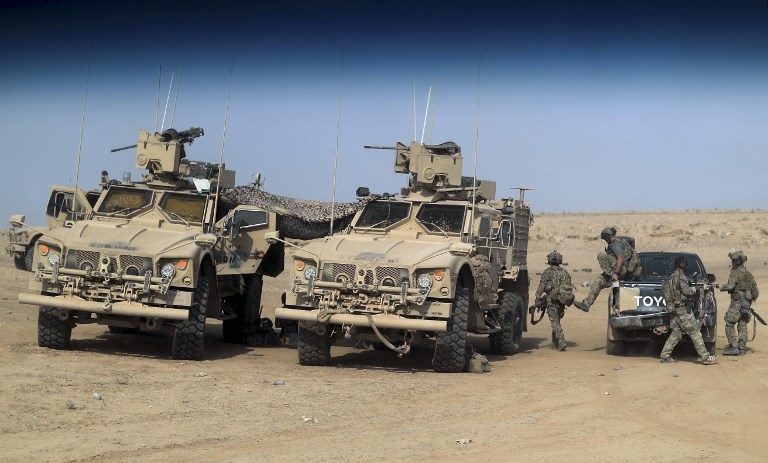
Although Damascus opposes the Turkish offensive in northern Syria as a violation of its territorial integrity, a top Syrian diplomat has ruled out possible rapprochement with the Kurdish-dominated Syrian Democratic Forces (SDF), calling the group "agents of Washington".
Syrian Deputy Foreign Minister Faisal Maqdad said on Thursday that the Kurdish-led fighters "had betrayed their country and committed crimes against it".
Earlier this week, a top SDF official said that the group was open to talks with the Syrian government and Russia in order to stop the Turkish operation and fill the security void left by the withdrawal of US troops.
While the Syrian army has not fought any major battles against the SDF during the country's civil war, Damascus has said that it aims to bring all Syrian territories under control of the government.
Backed by Washington, the SDF was a major US ally in the fight against the Islamic State (IS) group.
"We won't accept any dialogue or talk with those who had become hostages to foreign forces... There won't be any foothold for the agents of Washington on Syrian territory," Maqdad told reporters, Reuters reported.
Two days into Turkey's offensive, heavy clashes rocked areas along the Turkish-Syrian border.
At least 23 SDF fighters and eight civilians, two of them SDF administrators, have been killed, according to the Syrian Observatory for Human Rights (SOHR), a UK-based activist group.
Turkish President Recep Tayyip Erdogan says that Turkey's offensive will protect the Syrian people as Ankara aims to prevent the creation of a "terror corridor" and to establish a safe zone to which it can return millions of Syrian refugees.
'Disassociated from reality'
Syria vigorously objects to the Turkish offensive in its northern territory, calling it a breach of its sovereignty.
Damascus said the Turkish president's comments about protecting Syrian civilians during the military operation show that Erdogan is "disassociated from reality".
Why is Turkey invading northeast Syria?
+ Show - HideWho is fighting who?
Democratic Union Party (PYD)/Peoples Protection Units (YPG)
Founded in 2003, the PYD and its military wing the YPG are the ideological sister group of the Kurdistan Workers Party (PKK), which has fought a decades-long conflict with Turkey.
Following the beginning of the Syrian civil war in 2011, the PYD managed to take control of much of the Syria's north in the security vacuum that followed.
The group claims to espouse an ideology called "democratic confederalism", based on the ideology of PKK founder and leader Abdullah Ocalan, who has been in prison in Turkey since 1999.
Turkey
Turkey has long viewed the growth of the PYD with deep concern, and a peace process between Turkey and the PKK collapsed in 2015 in part over the spread of the Syrian Kurds' influence.
Since then, Erdogan has repeated his determination that he would "never allow the establishment of a Kurdish state in northern Syria".
What does Turkey want in northern Syria?
Turkey fears that a pro-PKK entity on its southern border would inevitably become a launchpad for attacks on Turkey.
In addition, Turkey wants to expell Syrian refugees from Turkey and resettle them in a "safe zone" it plans to create in northern Syria.
Turkey has the largest refugee population in the world, and the presence of Syrians in the country has increasingly led to animosity from Turks who blame them for crime, unemployment and the dilution of Turkish culture.
What does the PYD want in northern Syria?
The PYD's long-stated aim has been the creation of a statelet on the basis of Ocalan's ideology, as well as protecting Kurdish rights.
The area controlled by the PYD, known as Rojava, has established autonomy with networks of local councils and forums that aim to promote decentralised democracy - though the group has been accused of enforcing a one-party rule in the region.
What does the US-led coalition want?
Donald Trump was elected on a platform of isolationism and has touted the defeat of IS as the sole reason for US involvement in Syria - now that has largely taken place, Trump has argued the United States has no need to remain.
The biggest fear for the US and its allies is that Turkey's takeover of PYD-controlled areas could see the release of some of the 15,000 IS fighters previously captured by the Kurds and their allies.
What does the Syrian government (and its allies) want?
The Syrian government, as well as its close allies Iran and Russia, are happy about the US' decision to withdraw from the north, but have expressed concern about the violation of Syria's sovereignty by Turkey.
Syrian President Bashar al-Assad hopes that, when faced with the threat from Turkey, the PYD will throw their lot in with him in order to avoid total defeat.
Assad has repeatedly said he aims to regain control of all of Syria, and if the PYD was to ally with him formally, it would bring the largest area hitherto out of his control back under Damascus' influence.
"Erdogan's regime hides behind humanitarian slogans when it is far removed from them," an official from the Syrian foreign ministry told the government news agency, SANA.
The official added that Syria will confront Turkish "aggression" in the country.
"The task of protecting the Syrian people is the duty of the Syrian Arab Army and the Syrian state, and no one else," the official said.
'A big mistake'
US President Donald Trump, whose decision to withdraw troops is widely seen as being a green light for Turkey to invade Syria, said on Twitter on Thursday that he was talking to "both sides" and that he was trying to "end the endless wars".
Later on Thursday, Trump said resolving the conflict between Turkey and the Kurds would come down to three options: "We have one of three choices: Send in thousands of troops and win Militarily, hit Turkey very hard Financially and with Sanctions, or mediate a deal between Turkey and the Kurds!," he said in a Twitter post.
Following Trump's tweet, a senior US State Department official warned that if Turkey acts in a "dangerous" or "inhumane" way in its incursion in northern Syria, the United States would impose "significant costs" on Ankara.
The official said Trump is trying to find "common ground" between Turkey and Syrian Kurds to reach a ceasefire in the area. "We're hoping and exploring ways with both sides that we could find that path forward," the official said, adding that a negotiated settlement between the sides is Trump's preferred outcome.
The administration official called the president's tweets on Thursday a "concise summary" of the "very dangerous situation" in northern Syria.
"The United States will not endorse this invasion, will not give it any kind of political cover or in any way think it's a good idea," the official said.
"It endangers our allies in the fight against terror - the SDF - most of whom are from the region."
The official added that while Washington will not back Turkey in its operation, it also will not oppose the incursion militarily.
"Turkey is a NATO ally of ours… We do understand their security concerns. We just think they are making a big mistake going at it this way," the official said.
"This will not increase their security, our security or the security of anybody else in the region."
Middle East Eye delivers independent and unrivalled coverage and analysis of the Middle East, North Africa and beyond. To learn more about republishing this content and the associated fees, please fill out this form. More about MEE can be found here.


